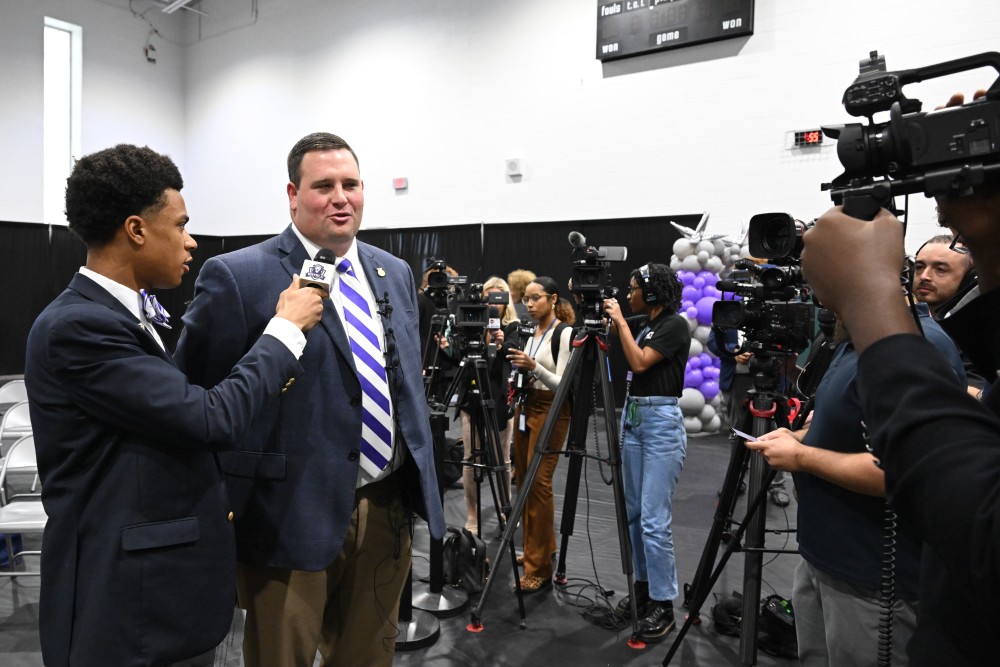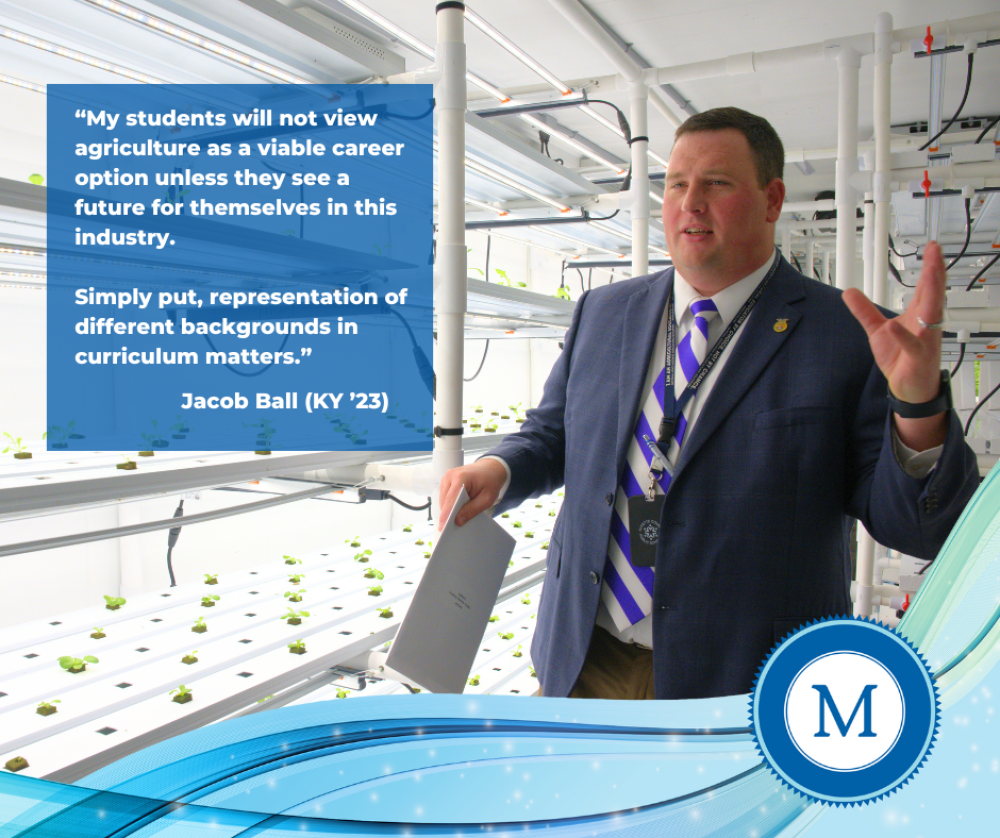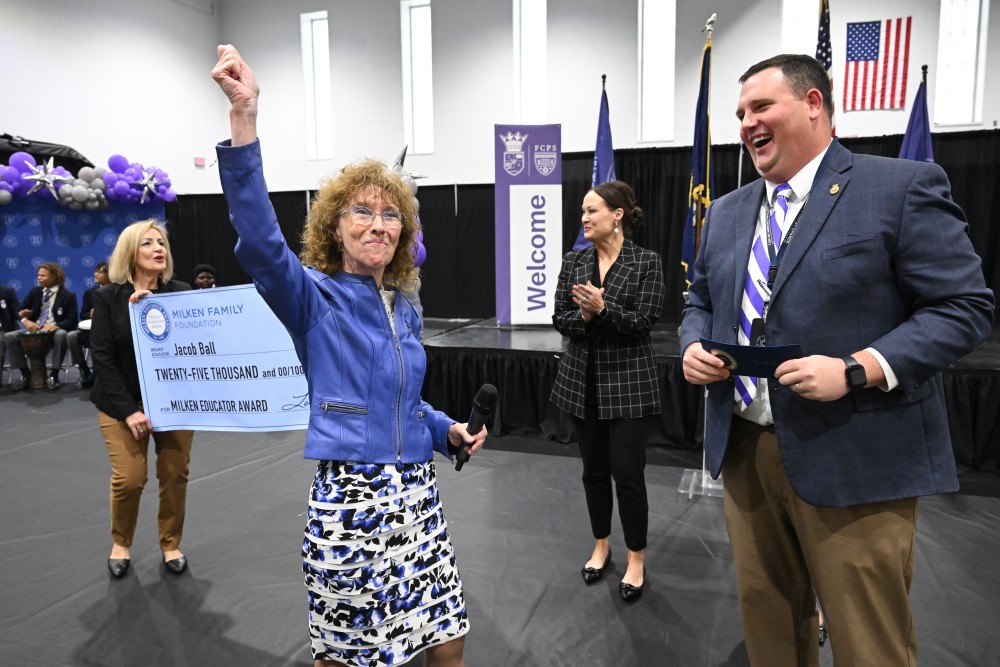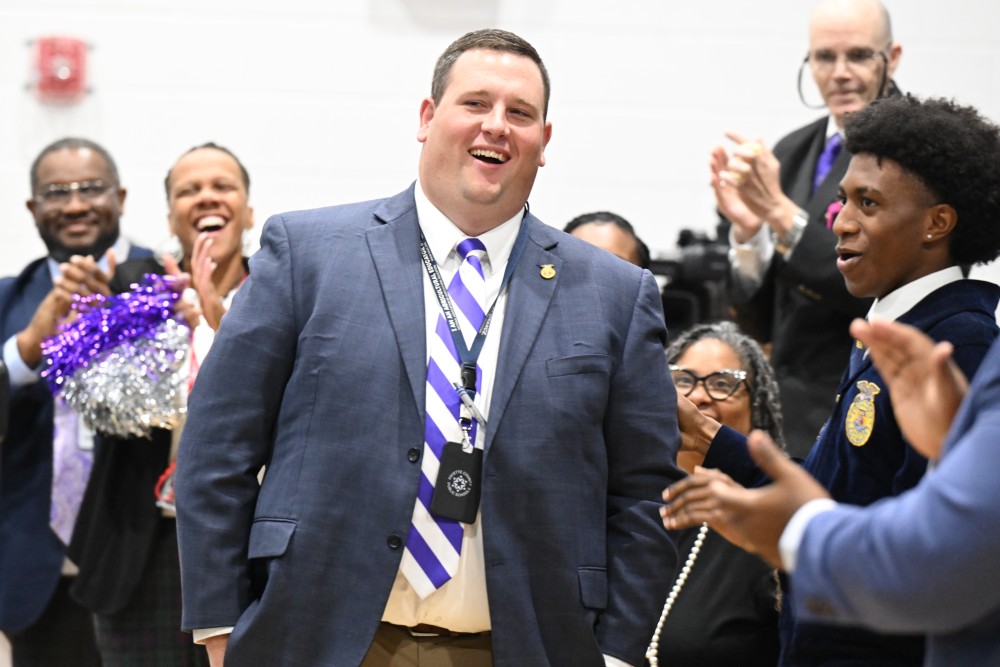Spotlight: Jacob Ball (KY '23)
June 4, 2024
From his roots in rural Kentucky to his innovative approach to agricultural education, Jacob Ball's story is one of dedication, empowerment, and the transformative power of teaching. At Carter G. Woodson Academy, where he pioneered the agriculture program, Ball's bond with his classroom and students is strengthened by the awareness that he plays a role in something greater. "I am not preparing students for a test; I see teaching agriculture as my calling to train and prepare the next generation of leaders who will feed the world." Jacob received a 2023-24 Kentucky Milken Educator Award in Lexington on October 27, 2023.
Milken Family Foundation: How have students responded since your Milken Educator Award surprise?
Jacob Ball (KY '23): The outpouring of support from current and former students was one of the most rewarding parts of this entire experience. I have received so many emails and messages of congratulations and support. I feel like this experience and outpouring of support have helped validate my decision to be an educator and made me realize the impact I have made over my career. I wish that all teachers could experience this! I think the scholars at Carter G. Woodson Academy enjoyed being a part of the ceremony and surprise factor. Since receiving the Award, scholars still want to know what my plans are with the $25,000 and like to joke about that! It certainly has helped the growth and engagement of students in my program and brought a spotlight of interest in agriculture and education as career options.
MFF: Who are your role models as an educator?
Ball: Like most teachers, I entered into this profession because of the impact that my teachers had on me as a student. I was fortunate to have an amazing group of agriculture teachers at Nelson County High School (Dr. Stacy Vincent, Josh Mitcham, Daniel Mattingly, Matthew Simpson, and Jason Detre) who inspired me to enter this profession and they still serve as mentors today. I am not sure of the exact number, but of the students that were at Nelson County during that time, we had at least five or six go into the agriculture teaching profession. Of those, John Hammond has served as another mentor during my career. I have had the opportunity to work with him in several capacities and he has been a vital influence to push me to improve myself both in and out of the classroom.
As I mentioned, I was fortunate to have amazing agriculture teachers and FFA (Future Farmers of America) advisors as a student. What I remember most about my time as a student and FFA member is the level of trust and responsibility our teachers placed on us, specifically through FFA. Our classes and FFA chapter were student-centered and student-led. As a teacher, good things tend to happen when you let students drive their learning and help build an organization that they have ownership of. As a teacher, I have tried to instill these values into my programs, and I feel that it has influenced the success that my students have experienced over my career.

MFF: Tell us about your first year of teaching.
Ball: My first year teaching was definitely a challenging experience that pushed me personally and professionally. I was hired as the agriculture teacher at Henderson County High School which was about three hours away from my hometown and friends and family. Not to mention that I was replacing an agriculture teacher who was retiring after 30+ years in that position and who was a living legend in the community!
Those circumstances definitely came with challenges as I tried to find my groove as a teacher while respecting the traditions of the previous teacher. It pushed me out of my comfort zone, but those challenges culminated with an experience I still remember. Our FFA Parliamentary Procedure Team won the Green River Regional Contest and competed at the state convention. Seeing students have that level of success at something we worked so hard at together was a feeling I will never forget! Because I was in a community that was new to me, establishing myself in the community and connecting with local supporters and industry were critical to helping me get through that first year. I had to develop a support system to make sure that my focus was on the growth of the program and students. Although I only stayed at Henderson County one year before moving back to my alma mater to teach, I will always be thankful that I pushed myself out of my comfort zone that first year and moved to a completely new community.
MFF: What do you hope students remember from their time with you?
Ball: I hope that when students reflect on their time in my classroom, they remember a teacher who provided them with opportunities to be successful, both in and out of the classroom. I hope that students remember me as a teacher who held them accountable and pushed them to reach high expectations. I hope that students remember my classroom and program as a place where they had fun and were successful. Lastly, I hope that every student leaves my classroom with an appreciation for the agriculture industry and sees agriculture as a potential career opportunity. It means so much to me as an educator when a student tells me that they are choosing agriculture as their career path or college major!

MFF: Your curriculum includes a focus on the contributions of Hispanic and African American farmers across the U.S. to the world of agriculture. Can you talk about the importance of this aspect of your teaching and the impact on your students?
Ball: At Carter G. Woodson Academy, our mission is to teach through the lens of African American and Hispanic cultures with culturally responsive instruction across all content areas. It is woven into the fabric of our school that teachers ensure that our student population sees themselves in the content we teach. The student population that I get the opportunity to work with has been underrepresented in agriculture for many years. My students will not view agriculture as a viable career option unless they see a future for themselves in this industry. Simply put, representation of different backgrounds in curriculum matters.
By elevating African American and Hispanic contributions to agriculture and incorporating the organization of Minorities in Agriculture, Natural Resources, and Related Sciences (MANRRS), I hope that I have created a more inclusive space for my students to thrive in agriculture. I truly believe that the work that agriculture teachers and FFA/MANRRS Advisors are doing across this nation is second to none. What we do as agriculture educators works. We just have to remove the barriers that prevent ALL students from choosing agriculture as a career option. I believe that my emphasis on various cultures helps break down those barriers and create an environment where students with diverse backgrounds will give agriculture a chance.
MFF: What advice would you share with people who are interested in becoming teachers?
Ball: For anyone interested in becoming a teacher, I would first say thank you for considering education! We desperately need great teachers across the country. I would also say that I love my career because I love what I teach! Agriculture is an industry that I am passionate about and am truly invested in helping improve and move forward. I think that I have stayed motivated and connected to the classroom because I feel that I am a part of something bigger. I am not preparing students for a test; I see teaching agriculture as my calling to train and prepare the next generation of leaders who will feed the world. So, find that area of education that you have a passion for and train future problem-solvers of that content area.
One other piece of advice I always give when speaking to potential teachers is that when you have your own classroom or program, keep the best interest of your students at the forefront of your decision-making process and preparation. I believe that the success of my classroom is rooted in the relationships I build with students, and the foundation of those relationships is that I feel students believe I have their best interests at heart. They know I care about them. If I am presenting them with an opportunity or an assignment or a project, they trust that it is beneficial to them.

MFF: Are you working on any interesting initiatives or new projects? Is there anything else you want to share about your classroom?
Ball: We are mostly just continuing to improve and build upon the work we have accomplished over the past few years. One of my focus areas for growth within our program is higher implementation of Supervised Agricultural Experiences (SAEs) with my scholars. Agriculture programs across the nation utilize SAEs as a way to help develop career skills and allow students to learn more through an individualized experience in agriculture that aligns with their interests. Now that my program is more established and agriculture is viewed as a viable career option, I want to work to establish strong SAEs and build more industry partnerships for student work-based learning experiences. Things are continuing to grow and improve each year. I am so fortunate and blessed to have been given this opportunity to start the agriculture program at Carter G. Woodson Academy. I love being a part of this program and seeing the impact these young men continue to make on the agriculture industry.
Watch our interview with Jacob Ball (KY '23) on the day of his Milken Award notification:
Don’t miss any new articles and updates from Milken Educator Awards:


